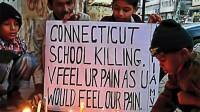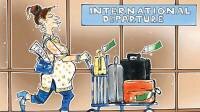In the blissful belle époque of obscurity when we were just another Asian country, mildly appreciated for the minimal racket of the 90s, it was actually pleasant to see Pakistan in the international media. Back then, as a veritable l’age d’or of discovery, finding yourself in the foreign press might have been occasional, even a little few and far between but it blipped every once in a while, to a satisfying smugness of not being forgotten but then again not exactly warmly regarded.
It was a pitiful one-upmanship, trying to find meaning in neglect in the face of the barrage of stories on India, nuclear footing to Nagan self discovery, Kasi to any of the Ks (Khan, Kumar etc) you could find in Bollywood.
It was a quiet existence.
But then, and how rude of them, they didn’t even ask, 19 men decided to fly some planes into buildings, their way of telling Muslims, in their flamboyant writing in the sky script no less, that “You have arrived!”
Plucked literally by the ear, overnight, Muslims went from being humble goat herders, shepherds, animal husbanders, taxi drivers, falafel stand operators and an assortment of other blue collar immigrant types to being that naughty malcontent who won’t get away with it.
Happening to be a Muslim country, Pakistanis graduated from being the corner shop owners, the taxi drivers, the token Asian in the classroom to Persons of Interest.
Being rediscovered, veritable volumes on our activities appeared, histories examined, suspicions renewed. Just what went on between booting out the Russians and becoming a terrorist hub? Did a decade of bad music, clothes and floppy Nick Carter-ish hair really have no effect? Well.
Of course while the guns were not necessarily pointed at us the cameras were and as the Coalition of the Willing got about their business, Pakistan had to prepare itself for the deluge of equipment, personnel, and private contractor like precision of the foreign media. They descended in hordes, like Huns, Gauls, Visigoths and Tartars and came, like ticks, to be embedded.
The embedded journalist or writer may have had the romantic ideal in Ernest Hemingway and wife, Martha Gellhorn, the latter being active in numerous theatres of war and documenting countless conflicts but in the decadent millennials with bellhops, satellites, hotel pools and bars, the embedded journalist, to paraphrase Kurtz, was fed on a diet of burgers and rock and roll — forgetting that there was a war going on.
Of course while the complaint was not as pronounced in Pakistan, it resounded particularly in Iraq. Having met a US marine who served there at a point, he noted how the embedded journalists never ventured out of the green zone, got what they could from their poolside vantage and most often only reported butcher’s bills with an occasional human interest piece of romantic liaisons at the Baghdad University and the heavy metal underground.
Here in our decade long diagnosis, the erstwhile embedded journalist became the ‘Islamabad Correspondent’ going from off-handed dismissal to “wait here, we’ve got a story.”
In one of the earliest pieces written during that initial reaction, AA Gill writing for the English GQ put up some inspired stuff. Offering Orientalist wit, anecdotal humour, disarming conclusions and the kind of characters one would find in a Graham Greene novel, Gill whittled down Pakistan (at least Islamabad and Peshawar) to its poxed core.
It was not a country where millions of different people lived but a setting for where each of the various characters witnessed or possibly imagined, operated and dispensed. It was the fiction of exoticism, the fallacy of stereotype.
The piece was quite matter of fact about our pretensions of being anything other than a “romantic” gateway, terse and indelicate, it was the kind of ‘hard truth’ article that may have been lauded for its reportage but the only thing astute about it was its derision of the-then Islamabad International airport.
Writing a near decade later for The New York Times, in more conciliatory tones, Bill Keller’s expose summed up the country as a land of “Black tea with milk, obsequious servants and a profound sense of grievance.”
Populated within the article were the kind of caricatures that were bred from the itinerant and yes, truly transient eye. ISI contacts are always shady and appear out of the veritable shadows, politicians are dumb and bungling, offering terms of love (Kim Barker), bureaucrats, stodgy and imperious, the common woman, nearly always an activist liberal trying to break free of the shackles of Islam and men and the common man either bearded and thus a zealot or clean shaven yet harbouring the fanaticism on the inside.
In a week or less, the writer summarized the country, doing so with a dash of dry wit and “Congealed Hollandaise.” Such minutiae are a staple of most of these articles, pronouncing the writer’s au courant knowledge of culture and condiments, more their tooting than article relevance.
But of course the above are the journalists who only drop by for a visit. The real correspondents meanwhile enjoy their time around town, being feted at one soiree or another, nearly always on the guest list of the rich, for a white man they must have and out of ennui perhaps, spice up their articles with tracts on good old Uncle Taliban.
When back in April, Hello! Pakistan, an off shoot of the global Hello! brand was launched, not a single article from the foreign press refrained from juxtaposing the launch of this lifestyle magazine to the ‘if all else fails’ line of bombs and beards because anything else from out of Pakistan would just not have been the same. The articles all ran with a single tenor; introducing the magazine, its aspirations and then quite discordantly alluding to either a religious scholar or slot machine mullah for their views on such effrontery and reiterating the point of ‘bomb blast #546 happened just yesterday’ for good measure.
It is as if the idea of a lifestyle magazine in such a country could not be countenanced, somehow belying of the truth.
One even remembers the self same lines when Newsweek (international edition) first discovered Zeb & Haniya, the sheer marvel of two girls singing in a country where the only harmonies were staccato gunfire and operatic explosions.
Even piddling news that barely warrants attention here finds its way to the international media again drumming up stale stereotypes and feckless reporting. Recently in Ramzan, police in Islamabad raided a couple of cafes serving lunch, a city page mention at best.
But days later it appeared in The Guardian as the brutish police “targeted” the innocent cafe society of Islamabad. Why these people could not eat at home, for free! is another matter entirely but as evidence of the repressive, baton wielding, liberal crushing, religiose state that Pakistan was, the country had made yet another entry into the annals of the wicked.
The writer is an art critic with an all-round media background based in Islamabad.
























